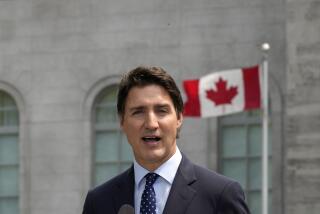Hijacking Free Trade
The move by the opposition Liberal Party in Canada to force, in effect, a national referendum on the U.S.-Canada free-trade agreement is a disappointment. It would nevertheless be a mistake to let this deter Congress from moving ahead this week to complete the American action on the agreement.
If the Liberals succeed in forcing national elections in the months ahead, they will be inviting an emotional and divisive campaign not likely to encourage the kind of cool calculations appropriate to a decision on a matter of such grave consequence. Already much of the opposition to the trade bill in Canada has seemed fueled more by historic animosities and jealousies of the giant North American neighbor than by hard economic realities. The real situation is that the two nations are already inextricably caught up in an integrated market that is a critical factor in the prosperity that they share. The rivalry and competition and cooperation of this, the greatest trading partnership in the world, have been good for the vast majority of people on both sides of the border, with only limited negative consequences for some isolated enterprises unable to meet the challenge. Most of the trade between the two nations already is free and unfettered. It makes sense to adopt this arrangement to make all of it free.
It is fine for John Turner, the leader of the Liberals, to say, âLet the people decide.â They have. The most reliable way for the people to decide is through the careful considerations of their elected representatives in the House of Commons. That body has already made clear its support of the treaty. Turner has forced the issue with a blockade of the treaty in the Senate, which is not popularly elected but which has parliamentary authority to stall the treaty past the deadline for agreement.
Prime Minister Brian Mulroney has accused the opposition leader of a maneuver âto hijack the most fundamental rights of the Canadian House of Commons.â So it would seem. If Turner prevails in forcing an election, it will be a critical test of the maturity and wisdom of the Canadian electorate, and will affect the economy of North America for years to come.
More to Read
Sign up for Essential California
The most important California stories and recommendations in your inbox every morning.
You may occasionally receive promotional content from the Los Angeles Times.










